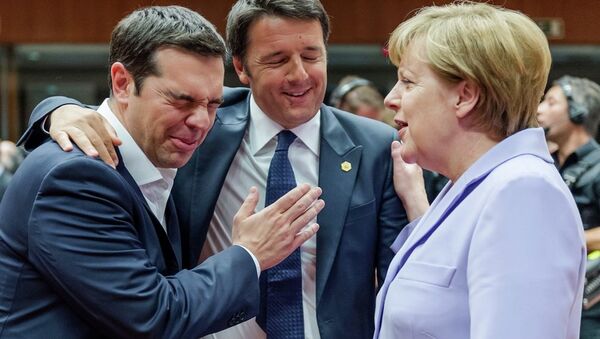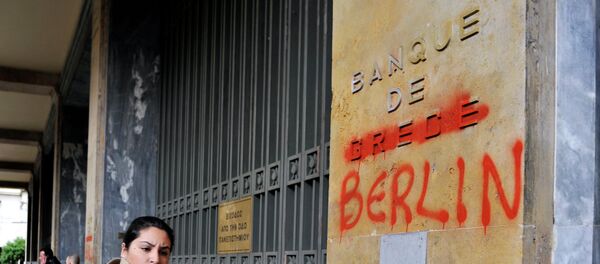Greece shot into the spotlight over its dramatic economic decline and Prime Minister Alexis Tsipras’ fall from grace. A country up to it eyes in debt was forced by the Troika to get on its knees and beg the EU bully boys (and girl) for more money.
You could be forgiven for thinking that people in Greece are a tiny bit irritated by the European Union… #troika pic.twitter.com/Vzg9ZSKhOs
— Rhys Tanner (@rhystanner1) September 14, 2015
It duly did, paying the price for it by committing its people to even harsher austerity conditions set by the European Commission, the European Central Bank and the International Monetary Fund — the deal brokered by German Chancellor Angela Merkel.
And once the deal was done it was time to cast a villain with Merkel playing the part of economic bully and the Greek people — the victim.
A German-based non-profit Halle Institute for Economic Research (IWH) has found that the German government has saved some 100 billion euros ($109 billion) in the Greece’s financial crisis thanks to lower borrowing costs.
Following the bailout to the tune of $93 billion with Greece practically stripped of all of its public assets, slogans appeared on Twitter boycotting German products, #BoycottGermany being the most popular.
#BoycottGermany German brands to avoid: pic.twitter.com/ycinJkFRwL
— Brett (@papicek) July 23, 2015
But the media focus promptly shifted to other victims, now on the Mediterranean islands, as thousands of refugees and migrants started arriving from Turkey.
Banksy #RefugeesWelcom #ouvrez_les_frontières pic.twitter.com/Ljc7SVHFCp
— Alioua Mehdi (@mehdialioua1) September 17, 2015
Greece has witnessed a 750 percent increase in the number of refugees living temporarily on its shores, waiting desperately to have their asylum claims processed. Amnesty International (AI) condemned the conditions that the refugees were forced to live in.
"This is not just a Greek tragedy, but a Europe-wide crisis," says Gauri van Gulik, AI’s International Deputy Director for Europe and Central Asia.
Meanwhile Germany, and indeed, Chancellor Angela Merkel has been hailed as an angel for her humanitarian response to the crisis and a savior to Syrian refugees.
Merkel taking selfies with Syrian refugees — via @Malcolmite #Syria #Germany pic.twitter.com/UAqYCiOpH9
— archicivilians (@archicivilians) September 10, 2015
Mrs Merkel said the public outpouring of donations and help to refugees should make her people feel "proud and grateful". Germany also temporarily suspended the Schengen agreement and Dublin rules, allowing refugees to enter the country without risk of being sent back to the first country in which they arrived.
We´re back to a different Greece and Athens than the one we left.. refugees on the sidewalks in central Athens. #ThisIsACoup #thisisgreece
— Sofia Sofroniadou (@Sofiaatwork) September 17, 2015
The influx of refugees into Europe on every route possible is the biggest crisis Europe has had to face since the Second World War with many countries building walls and fences along their borders to keep the refugees and migrants out.
Abhor #FinancialTerrorism used by #Troika w/#Greece. Can't but applaud #Germans 4 #Syrian generosity so time to end #BoycottGermany campaign
— Anonymous_redpill (@sine_injuria) September 4, 2015
It seems European Union members have a short-term memory problem. Their generosity and openness to migrants remains in stark contrast to the austere attitude shown to citizens on their own doorstep.
The refugee crisis continues and so does the economic situation in Greece, forcing people, not just refugees into poverty, unemployment and homelessness.



